Veranstaltungen und Aktivitäten
DIJ Newsletter Summer 2025
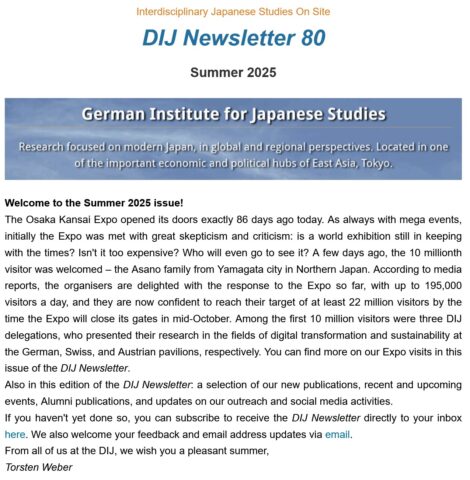
The summer issue of our DIJ Newsletter features updates on our research, publications, and events as well as news from the Institute, our team, and our outreach activities. We hope you will enjoy exploring this new edition of the DIJ Newsletter. If you haven’t done so yet, you can subscribe to receive our Newsletters directly to your inbox. The full issues and subscription form are available here.
New book by Carolin Fleischer-Heininger studies Terayama Shūji and his influence on Japan’s post-war society
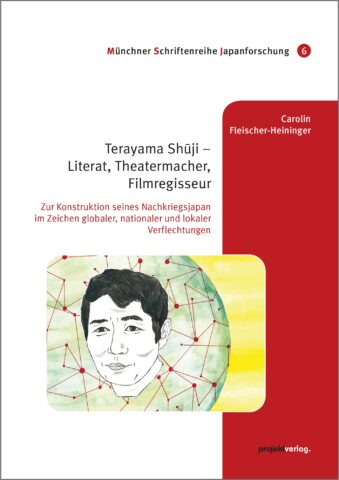
What can literary and artistic works reveal about their time – and how do they shape it? In her new book Terayama Shūji – Literat, Theatermacher, Filmregisseur. Zur Konstruktion seines Nachkriegsjapan im Zeichen globaler, nationaler und lokaler Verflechtungen, DIJ researcher Carolin Fleischer-Heininger explores the construction of postwar Japan through literary, dramatic, and cinematic works of Terayama Shūji (1935–1983). Her study considers the different spatial frames of reference – Aomori, Japan and the world – that guided Terayama’s views and analyses his works with regard to formal and stylistic characteristics. As she shows, Terayama shaped Japan’s cultural landscape by mirroring Japanese society and its narratives. Consequently, Terayama became one of Japan’s most influential and controversial cultural figures. Drawing on theories of globalization and cultural history, Fleischer-Heininger also examines how Terayama’s works negotiate narratives of national identity and historiography in postwar Japan.
DIJ Researchers at ‚Japanologentag‘
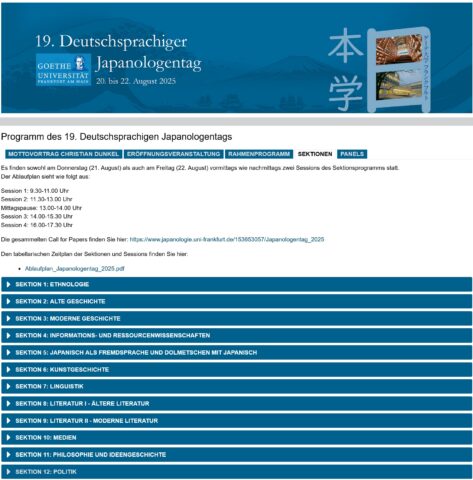 From 20 to 22 August 2025, DIJ researchers Carolin Fleischer-Heininger, Barbara Holthus, Isaac Gagné, Nicole M. Mueller, Dolf-Alexander Neuhaus, Christina Polak-Rottmann, Sebastian Polak-Rottmann, Celia Spoden, Torsten Weber, and Alberto Zizza will participate in the triennial Japanologentag at Goethe University Frankfurt. They will present their latest research in the sections of ethnology, modern history, modern literature, media, philosophy and history of ideas, sociology and in a panel on Japan’s imperial legacy. We also look forward to meeting more than thirty DIJ alumni at the conference.
From 20 to 22 August 2025, DIJ researchers Carolin Fleischer-Heininger, Barbara Holthus, Isaac Gagné, Nicole M. Mueller, Dolf-Alexander Neuhaus, Christina Polak-Rottmann, Sebastian Polak-Rottmann, Celia Spoden, Torsten Weber, and Alberto Zizza will participate in the triennial Japanologentag at Goethe University Frankfurt. They will present their latest research in the sections of ethnology, modern history, modern literature, media, philosophy and history of ideas, sociology and in a panel on Japan’s imperial legacy. We also look forward to meeting more than thirty DIJ alumni at the conference.
Hybrid Study Group on Carl Schmitt’s legal theory and contemporary politics
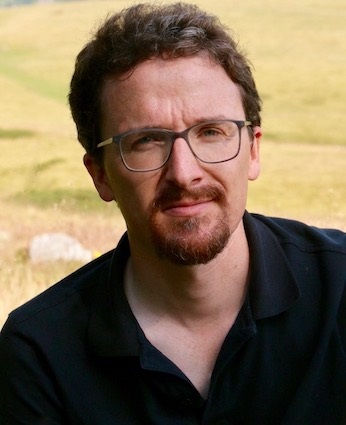
Democratic backsliding in liberal democracies, along with the rising influence of authoritarian regimes, has been linked to the ideas of German legal theorist Carl Schmitt. Far-right intellectuals in Europe, Russian imperialist ideologues, and figures associated with the Trump administration in the United States explicitly reference the “crown jurist of the Third Reich.” In East Asia, Schmitt’s reception has been notably active—particularly in China. Schmittian concepts such as Großraum (great space), previously rejected due to their compatibility with Japan’s former “Greater East Asia Co-Prosperity Sphere,” now serve other geopolitical ambitions. Yet, the status and normative implications of Schmitt’s ideas, especially when deployed against the international liberal order, remain unclear. Do they truly constitute a coherent alternative model? This presentation examines the relationship between Schmitt’s conception of legal theory and its application to politics today. Details and registration here
Onsite Study Group „Practices and rituals of magical control in East Asia“

The resilience and popularity of “non-rational” ritual practices performed for “rational” reasons represent an important window into key sociological and anthropological themes surrounding urbanization and modernization. Specifically, the widespread presence of sacred sites like small streetside shrines tucked into urban spaces call us to reexamine theoretical assumptions regarding the meanings of “magical” rites. Based on fieldwork in Japan and Hong Kong, this talk discusses preliminary reflections on our collaborative research project which looks at this set of issues through the lens of contemporary German theory of social practices (Bartmanski) and American anthropological frameworks (Gagné). It seeks to provide new perspectives on the theoretical and practical implications of the resilience of practices and rituals of magical control in modern societies. Details and registration here
DIJ Workshop ‚Revisiting the Asia-Pacific War in Japan‘
 On November 11, 2024, the Nobel Committee decided to award the Nobel Peace Prize for 2024 to the anti-nuclear weapons movement Nihon Hidankyō. This decision not only acknowledged the movement’s ongoing commitment, shaped by its members’ traumatic experiences of ‘Hiroshima’ and ‘Nagasaki’. It was also an attempt to shape the present and imaginatively construct possible livable futures. Likewise, written history is often considered a fiction that primarily contributes to the formation, stabilization, and self-assertion of nation-states. In Japan, dominant historical narratives, such as Japanese victimization, have been foundational since the post-war period. The participants in the workshop Revisiting the Asia-Pacific War in Japan: Cultural Artifacts and Intellectual Discourse, organised by DIJ researcher Carolin Fleischer-Heininger, will explore how these narratives are being selectively contested by cultural artifacts and counter discourses. This event is part of the Max Weber Foundation series The Ends of War. International Perspectives on World War II. Details and registration here
On November 11, 2024, the Nobel Committee decided to award the Nobel Peace Prize for 2024 to the anti-nuclear weapons movement Nihon Hidankyō. This decision not only acknowledged the movement’s ongoing commitment, shaped by its members’ traumatic experiences of ‘Hiroshima’ and ‘Nagasaki’. It was also an attempt to shape the present and imaginatively construct possible livable futures. Likewise, written history is often considered a fiction that primarily contributes to the formation, stabilization, and self-assertion of nation-states. In Japan, dominant historical narratives, such as Japanese victimization, have been foundational since the post-war period. The participants in the workshop Revisiting the Asia-Pacific War in Japan: Cultural Artifacts and Intellectual Discourse, organised by DIJ researcher Carolin Fleischer-Heininger, will explore how these narratives are being selectively contested by cultural artifacts and counter discourses. This event is part of the Max Weber Foundation series The Ends of War. International Perspectives on World War II. Details and registration here
Gerald D. Feldman Travel Grants for multi-country research projects
 You are an early career researcher looking for funding for research stays abroad of up to one month? If your countries of interest match, why not consider applying for a Gerald D. Feldman Travel Grants for researchers in the humanities and social sciences? Offered by the Max Weber Foundation (MWS), the travel grants allow you to conduct your own research project in two or three of the countries which are home to MWS institutes and branches or at the Richard Koebner Minerva Center for German History in Israel. We particularly encourage applicants whose research includes Japan. Application deadline: 5 October 2025. Please see the full call, list of possible host countries, and application guidelines here
You are an early career researcher looking for funding for research stays abroad of up to one month? If your countries of interest match, why not consider applying for a Gerald D. Feldman Travel Grants for researchers in the humanities and social sciences? Offered by the Max Weber Foundation (MWS), the travel grants allow you to conduct your own research project in two or three of the countries which are home to MWS institutes and branches or at the Richard Koebner Minerva Center for German History in Israel. We particularly encourage applicants whose research includes Japan. Application deadline: 5 October 2025. Please see the full call, list of possible host countries, and application guidelines here
Japan-Stipendien für Promovierende
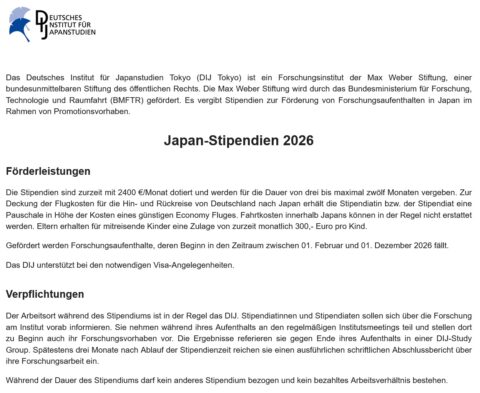 Auch dieses Jahr vergibt das DIJ wieder attraktive Stipendien zur Förderung von Forschungsaufenthalten in Japan im Rahmen von Promotionsvorhaben. Die Stipendien sind mit zurzeit 2400 Euro/Monat dotiert und werden für die Dauer von drei bis maximal zwölf Monaten vergeben. Gefördert werden Forschungsaufenthalte, deren Beginn in den Zeitraum zwischen 1. Februar und 1. Dezember 2026 fällt. Über die Voraussetzungen sowie das Bewerbungsverfahren informiert unsere Ausschreibung und Stipendienordnung. Bewerbungsschluss für diese Ausschreibung ist der 30. September 2025.
Auch dieses Jahr vergibt das DIJ wieder attraktive Stipendien zur Förderung von Forschungsaufenthalten in Japan im Rahmen von Promotionsvorhaben. Die Stipendien sind mit zurzeit 2400 Euro/Monat dotiert und werden für die Dauer von drei bis maximal zwölf Monaten vergeben. Gefördert werden Forschungsaufenthalte, deren Beginn in den Zeitraum zwischen 1. Februar und 1. Dezember 2026 fällt. Über die Voraussetzungen sowie das Bewerbungsverfahren informiert unsere Ausschreibung und Stipendienordnung. Bewerbungsschluss für diese Ausschreibung ist der 30. September 2025.





 Open Access
Open Access 
